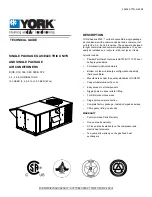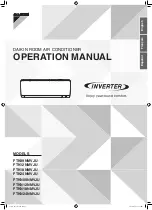
(Mar, 2012)
Compact CWE Series Installation, Operation & Maintenance Manual
Air Technology Systems, Inc.
2-1
2.0
INSTALLATION
2.1 Receiving the Equipment
Your
Compact CWE
system has been inspected and
tested prior to shipment. To ensure your equipment
has been received in excellent condition, perform
immediately inspect the unit for damage which may
have occurred during shipment. If any is found, report
it to the carrier immediately. Any obvious damage
incurred during shipping must be noted on the freight
carrier’s delivery forms BEFORE signing for the
equipment. Freight claims must be done through the
freight carrier. Generally, all equipment ships “FOB
Factory”. SATS can assist in the claim fi ling process
with the freight company. Refer to section fi ve of this
manual for instructions.
Carefully remove the shipping cover. Remove/open
the access panels, remove any loose parts, and
check the equipment against the packing list to see
if the shipment is complete. Report all discrepancies
to the appropriate authority. Inspect the interior of
the unit for any signs of transit-incurred damage.
Should any damage be present, notify SATS Product
Support prior to attempting any repairs.
A Data Package has been sent with your unit. It
contains this manual, a supplemental microprocessor
controller manual, system drawings, applicable
MSDS’s, warranty registration form and other
component manuals and applicable instructions
based on the confi guration and options included with
your unit. The data package has been placed in your
unit inside a clear plastic bag. These documents
should be retained with the unit for future reference.
NOTE
Items that have been shipped loose, such as
controllers, temperature/humidity sensors,
water detectors, etc., are shipped inside the
air conditioner unless specifi ed otherwise by
the customer. The plenum box (if applicable)
is shipped separately. Unpack and store these
items in a safe place unless you are using them
immediately.
2.2 Site Preparation
Compact CWE
systems are designed with easy
service access in mind. Hinged access doors are
located on the front of the cabinet. The number of
doors vary depending on size and confi guration
of the unit. Each unit has a door for accessing the
electrical box. In order to have full service access
to internal components, no permanent obstructions
should be placed in front of the unit. See Figure 5 for
the minimum recommended installation clearance in
front of the unit.
NOTE
Working clearance requirements need to be
established prior to mounting the unit. Refer to
local and national electrical codes.
When determining the installation location consider
how you’ll route the piping and wiring into the cabinet.
Ensure access is available for routing the piping and
wiring if entering through the side of the cabinet (see
Section 2.7.1). The cabinet may be positioned in a
corner and if necessary a service opening may be cut
into the wall for access to install the piping and wiring
from an adjoining room.
39"
(MINIMUM FRONT
CLEARANCE)
CONTROLLER
SERVICE
DISCONNECT
SWITCH
SEE NOTE
SEE NOTE
NOTE: WHEN INSTALLING UPFLOW UNITS, ALLOW ACCESS FOR PIPING AND
WIRING IF ROUTING IT THROUGH THE SIDE OF THE CABINET.
Figure 5- Recommended Installation
Clearance
CAUTION
The A/C unit must be installed in a space that
will be air conditioned.
2.2.1 Conditioned Space
Certain steps may be taken to minimize the effects
of the environment surrounding the conditioned
space. This is especially true for critical/precision
room preparation (computer rooms/labs) requiring













































